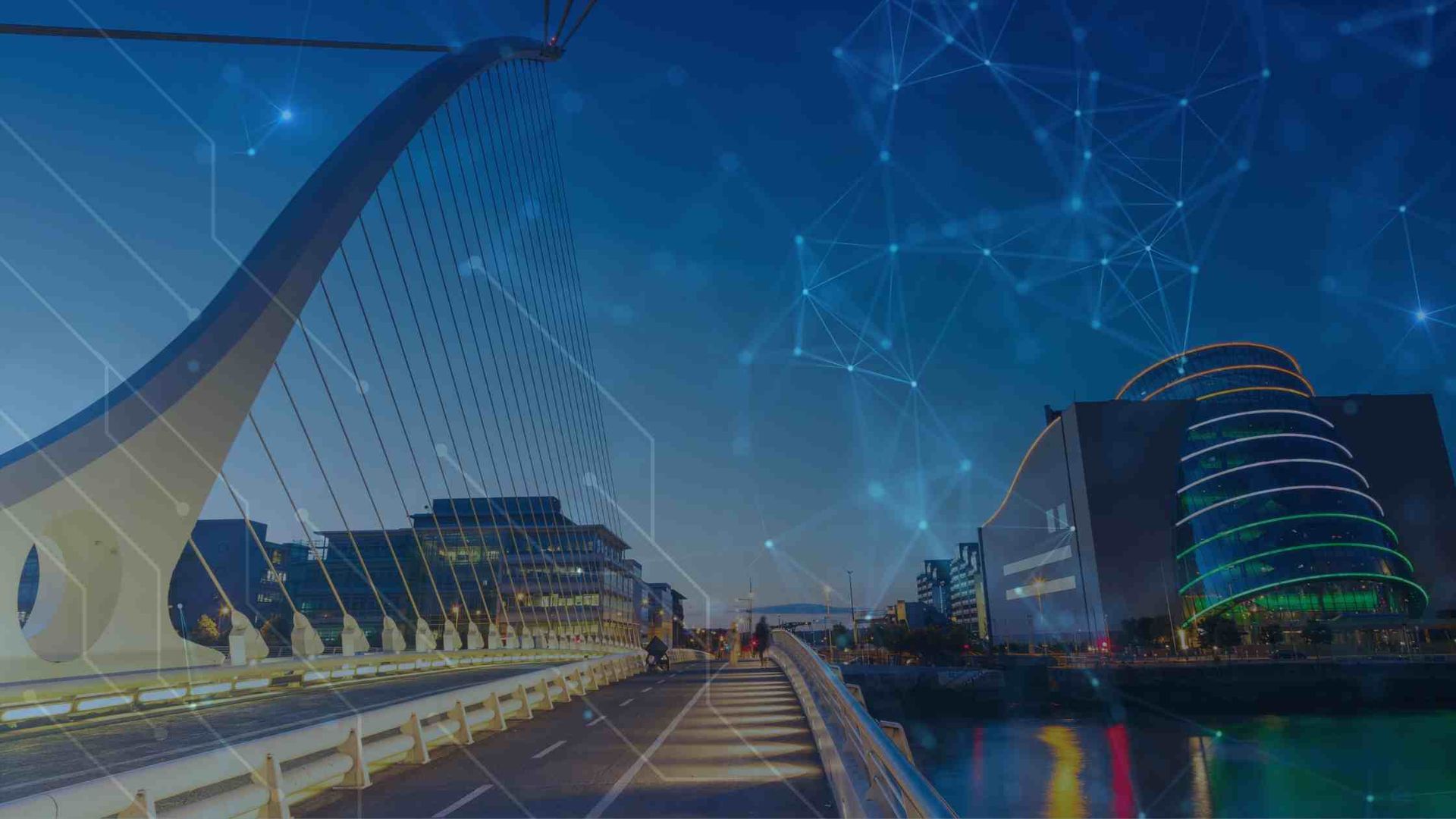Charting the Evolution of Work in Ireland - Anticipated Trends and Forecasts for 2024
As we stand on the cusp of 2024, the landscape of work in Ireland continues to evolve, spurred by technological advancements, societal shifts, and the valuable lessons learned from navigating the global pandemic.
The future of work is a tapestry woven with dynamic threads of innovation, flexibility, and adaptability. At Mason Alexander, we’ve explored some of the current trends and data that are shaping this evolving landscape, to offer some predictions into what lies ahead for the future of work in Ireland for 2024 and beyond.
This exploration allows us to equip both companies and individuals with some insights, enabling them to chart their course through the ever-changing landscape of work with clarity and confidence.

1. Remote Work Revolution
The seismic shift towards remote work that gained momentum during the pandemic has solidified its place as a pivotal force in the Irish workforce. There has been a remarkable increase in remote work adoption, with Ireland having one of the largest proportions of remote workers, outpacing its European counterparts.
Analysis by BNP Paribas Real Estate Ireland reveals a significant shift: from 7% in 2019 to 25% in 2022, marking the most substantial surge in remote work adoption globally. This rapid transition was catalysed by the COVID-19 pandemic, positioning Ireland among the top countries fostering remote work culture. Furthermore, statistics from a survey completed by Comreg, the Irish telecoms regulator, show that now a third of Irish office staff work from home three days per week.
Businesses would be wise to keep some degree of hybrid work options available for their employees. From a recent LinkedIn poll, 56% of respondents stated they have a hybrid work setup, 29% said they work 100% remotely, and only 15% said they were fully office-based. We asked candidates would they turn down a job offer that didn’t meet their flexible work arrangement and a whopping 91% said they would. Research from Deloitte also found that 2 out of 3 hybrid workers would leave their organisation if they were required to go into the office full-time.
This shift is not merely a temporary response to the pandemic but a structural transformation. Employers are witnessing enhanced productivity, improved work-life balance, and expanded talent pools. As a result, hybrid work models are becoming the new norm, blending the benefits of remote work with in-person collaboration.
Recommendations for Employers:
- Hybrid Work Policies: Develop comprehensive hybrid work policies emphasising communication tools, flexibility, and a balance between remote and in-person work.
- Cybersecurity: Invest in cybersecurity measures and remote work infrastructure to ensure a secure and efficient remote work environment.
2. Embracing Technology
Advancements in technology, including artificial intelligence (AI), machine learning, and automation, are reshaping roles and skill requirements. According to McKinsey, while prior AI waves mostly affected physical work, the emergence of gen AI is set to significantly impact knowledge work, spanning fields such as education, law, technology, and the arts.
Despite the potential, there's a notable gap between aspirations and actions. An IBEC report highlights that while 59% see AI’s potential to boost productivity and work conditions, only 29% feel their organisation possesses the necessary AI skills. This aligns with findings from McKinsey, indicating that while 90% of leaders believe gen AI should be used frequently, 60% note their organisation rarely or never does.

Ireland, heralded by the IDA as a frontrunner in AI development in Europe, witnesses substantial investments from multinational firms in AI research centres. Collaborative efforts between the Irish government, educational institutions, and businesses will need to equip the workforce with vital digital skills.
Moreover, recent strides in AI, notably the release of ChatGPT in November 2022, have widened AI’s application scope in workplaces, allowing the creation of various content types. The gap between the desire to use AI and actual implementation is expected to narrow as confidence in AI grows among employers and workers in 2024.
Our community, Leaders of Tech, recently put together some research on the impact AI is having and will continue to have on the way we work. For further information on this insights report, you can download it for free.
Recommendation for Employers:
- Learning and Development: Prioritise continuous learning and development programs, encourage employees to acquire new skills and invest in partnerships with educational institutions or online learning platforms.

3. Workplace Well-being and Mental Health
The mental health landscape in Irish workplaces presents some concerning trends. Despite mental health issues costing the economy €11 billion annually, 80% of employers don't invest in workplace mental health – according to a recent study conducted by University College Cork.
While 76% acknowledge responsibility for employee well-being, only 32% have a structured approach in place. Merely 20% allocate dedicated budgets for mental health initiatives.
Moreover, post-pandemic, mental health-related absenteeism has surged. Reports indicate a significant increase in mental health-related sickness absences, highlighting a growing challenge for Irish employers. Presenteeism, the practice of working while ill, has also been observed at a higher rate (27%) compared to businesses in England (21%), often due to the pressures of meeting deadlines and client demands.
The shift to remote or hybrid working, embraced by 32% of firms post-pandemic, presents mixed outcomes. While beneficial for employee happiness and productivity, it poses challenges for teamwork. Smaller businesses, with resource constraints and informal practices, seem less equipped to address mental health and well-being issues.
Larger firms (57%) provide mental health support, but smaller companies lag behind at just 20%. The gap between acknowledging the seriousness of mental health issues and actual actions remains significant.
This research underscores a pressing need for businesses to prioritise mental health and well-being initiatives in the workplace, acknowledging that employee well-being is not just a moral imperative but a strategic business investment that cultivates loyalty, productivity, and retention.
Effective strategies encompass structured mental health plans, regular monitoring of employee well-being, and leadership engagement. As the issue intensifies, it is imperative for organisations to proactively address mental health challenges, fostering supportive work environments and holistic well-being initiatives for their employees.
Recommendations for Employers:
- Prioritise Mental Health Investment: Allocate resources specifically for mental health initiatives, including counselling services and awareness programs, to create a supportive environment.
- Foster Supportive Cultures: Train managers to champion mental well-being, promote open discussions, and reduce stigma around mental health concerns within the workplace. Develop and communicate mental health policies and resources transparently within the organisation.
- Flexible Work and Regular Check-ins: Implement flexible work policies to accommodate mental health needs, conduct regular check-ins with employees, and provide accessible mental health resources to support well-being. Encourage regular breaks, mindfulness practices, and wellness initiatives to support employee mental health. Foster a healthy work-life balance to boost employee morale and productivity.
4. Contract Economy and Flexible Work Arrangements
The freelance economy in Ireland is on the rise, with more individuals opting for contract, temporary, or part-time work. This trend aligns with the surge in flexible work arrangements, offering employees autonomy over their schedules and spaces, fostering increased satisfaction and engagement.
In our recent LinkedIn survey, 48% highlighted flexibility as the top perk of contract work, while 39% cited higher earnings as a driving factor. Businesses are increasingly turning to contract and temporary staffing solutions to meet evolving workforce needs, tapping into specific talents and controlling workforce changes.
This shift benefits various industries in Ireland, from technology to healthcare, providing immediate access to specialised skills as required. Contract employees offer specific skills for projects or tasks, providing flexibility to adapt to market changes without the commitment of long-term employment. Companies are embracing contract recruitment to meet dynamic workforce demands and experiment with innovative approaches.
At Mason Alexander, our tailored contract recruitment solutions cater to diverse employer needs across Ireland through our specialised consultants.

Recommendations for Employers:
- Embrace Flexibility: Consider offering flexible work arrangements to attract skilled professionals. Providing autonomy over schedules and spaces can enhance employee satisfaction and engagement, contributing to a positive work culture.
- Explore Contract Recruitment: Consider leveraging contract staffing solutions to address evolving workforce needs. This approach allows access to specialised skills, controlling changes in staffing requirements, and testing innovative strategies without long-term commitments.

5. Diversity, Equity, and Inclusion (DEI) Initiatives as a Business Imperative
The call for diversity, equity, and inclusion will amplify in 2024 as organisations recognise the business value it brings. Diverse teams foster innovation, creativity, and better decision-making. Companies need to go beyond tokenism and implement comprehensive DEI strategies. This includes diverse hiring practices, fostering an inclusive workplace culture, and creating equal opportunities for all employees. Measurement and accountability through regular diversity audits and transparent reporting will be crucial in tracking progress.
Recommendations for Employers:
- Implement diverse hiring practices and inclusive policies, ensuring fair opportunities for all.
- Establish diverse leadership teams, and create an inclusive workplace culture that celebrates differences.
- Foster a culture of openness and respect by educating employees on the importance of diversity and inclusion.
6. Sustainability Steers the Future of Work
Record-high temperatures, extreme weather events, and unprecedented precipitation underscore the urgency for corporate responsibility in curbing carbon emissions and mitigating environmental impact. Just 100 global companies were accountable for 71% of the world’s greenhouse gas emissions in the past three decades, prompting mounting pressures on major companies to reduce carbon emissions from consumers, investors, and regulators, thereby affecting their suppliers.
Recognising this pressing need for action, forward-thinking companies are intensifying efforts to combat climate change while prioritizing employee well-being and safety. They're adjusting work schedules and promoting remote work to ensure safety, reduce carbon footprints, and mitigate climate challenges.

Simultaneously, Fáilte Ireland's recent appointment as a Sustainable Development Goal (SDG) Champion for 2023-2024 exemplifies Ireland's commitment to a sustainable future. This initiative steers various industries, notably within the vibrant tourism sector, toward eco-conscious practices. Alongside 26 industry leaders, Fáilte Ireland advocates sustainable initiatives and raises awareness about the United Nations' SDGs, fostering a culture of sustainable practices.
Additionally, in response to regulatory shifts, EU mandates compel organisations to transparently report their environmental impact. These directives reinforce the necessity for robust climate strategies and proactive compliance with ESG disclosures, fostering accountability and sustainable practices.
Recommendations for Employers:
- Strategic Climate Response: Introduce climate-conscious workplace policies, such as flexible work hours and prioritising remote work for reduced carbon footprints.
- Employee Engagement in Sustainable Practices: Educate and involve employees in sustainability programs, fostering a culture that champions eco-friendly practices within the workplace.
- Proactive Compliance: Proactively comply with evolving ESG disclosure requirements and sustainability reporting, demonstrating corporate accountability and commitment to a sustainable future.
Conclusion
The future of work in Ireland is an intricate tapestry woven with innovation, adaptability, and a deep understanding of the evolving needs of the workforce. As we navigate the dynamic landscape of technological advancements, remote work, well-being initiatives, and flexible arrangements, one thing remains certain: change is inevitable.
At Mason Alexander, we remain committed to guiding both employers and job seekers through these transformative times, leveraging our expertise and insights to navigate the ever-evolving terrain of work in Ireland.



